
What will happen to the Bucs, specifically Bucs head coach/defensive coordinator Raheem Morris, at season’s end is anyone’s guess.
No one, not Bucs rock star general manager Mark Dominik, not Team Glazer, has come out (yet) and given the embattled Bucs coach a vote of confidence. So without sitting in a boardroom at One Buc Palace, no one knows if Morris is twisting in the wind or if his job is safe.
Morris has one year left on his contract, which could be a can of worms. Mike Florio, the creator, curator and overall guru of ProFootballTalk.com recently said that one of the paradoxes of having a coach with one year left means “free agents won’t want to come here” because of the uncertainty.
Of course, until 2013 when teams are required to spend a large percentage of the salary cap season on player payroll, that is probably irrelevant as the Bucs are building through the draft. Having but one year left on Morris’ contract also handcuffs the Bucs if they would want to bring in new assistants or replace departed ones; good assistants don’t want an uncertain future.
Joe rmembers last winter he was talking with Gil Brandt. For those unaware, Brandt may have been one of the greatest front office minds in NFL history. He was the architect of the Cowboys from their franchise birth through the first months of the Jerry Jones/Jimmy Johnson era.
Anyone who listens to Brandt on SiriusXM NFL Radio knows Brandt is a treasure trove of information and was obsessed with scouting talent, going to all corners of the country to find players, and he possesses a photographic memory that is unequaled in sports radio.
When Joe asked Brandt if Morris would have his contract re-upped by the Bucs, Brandt looked Joe straight in the eye and without blinking responded, “How many tickets are they selling in Tampa?”
The response took Joe aback. Joe never thought of a coach’s job security in that manner, but it did remind Joe that, at the end of the day, the NFL is a business and it’s not exactly all about wins and losses, but dollars and cents (just ask Bill Bidwill).
Now let Joe be clear: Until this past Sunday, Joe thought Morris’ job was safe, that Team Glazer would bring him back if not extend his current contract. Since Sunday, Joe isn’t as certain.
Brandt’s response to Joe has haunted him ever since that freezing Dallas afternoon. It’s been lodged in the back of Joe’s head since and whenever someone asks Joe if he thought Morris would be brought back, Joe would respond, “Yes, but… ” and tell the curious questioner about Brandt’s statement.
Joe regaled a fellow media member Sunday with this story, and said media member scoffed that ticket sales are irrelevant, saying that revenue from TV networks so dwarfs gate revenue that it’s not worth even bringing up.
Oddly enough, Monday the Sports Business Journal reported that the NFL was on the cusp of finalizing new contracts with all of its media partners that would bring revenue for all teams to a staggering amount annually, with no end to the rivers of cash in sight.
The size and scope of these deals offer further proof of the stunning power of NFL programming, which makes up the highest-rated shows on TV. Looking at the total revenue from the next round of national media deals puts the immense nature of the deals into better context. Combined with ESPN’s annual average of $1.8 billion a year for “Monday Night Football,” DirecTV’s out-of-market “Sunday Ticket” deal, the league’s planned Thursday night game package that it is preparing to shop, Sirius Satellite Radio, Westwood One radio and Verizon’s mobile deal, the NFL could wind up generating close to $7 billion annually in national media revenue starting in 2014. That represents a whopping 64 percent increase over the $4.28 billion that the NFL received from national media before the most recent round of renewals.
In fact, the $7 billion figure is more than the league’s total combined revenue from just a few years ago.
The league’s huge rights fee increases are coming far quicker than even the most optimistic projections. In February, Moody’s Investor Services predicted that NFL media money would hit $8 billion annually over the next two renewal rounds. With these deals, the league will close in on the figure after just its first renewal round.
With a calculator, that brings revenue just from media partners alone per team to $218 million dollars a year. Without going into too much legal mumbo jumbo, the NFL salary cap for 2011 is roughly $120 million.
(These figures do not include Spanish-rights broadcasts which are being negotiated. All of the contracts are based on 16-game schedules.)
If the figures from the Sports Business Journal are accurate, Joe can easily see how gate revenue influencing Team Glazer’s decision whether or not to retain the services of Morris is trival at best and likely a non-factor. The number of season tickets sold probably will have zero influence over Morris’ job status.
While Brandt had a very, very, very valid point to Joe not quite a year ago, Brandt was using an NFL standard that is now obsolete.
Welcome to the new NFL.





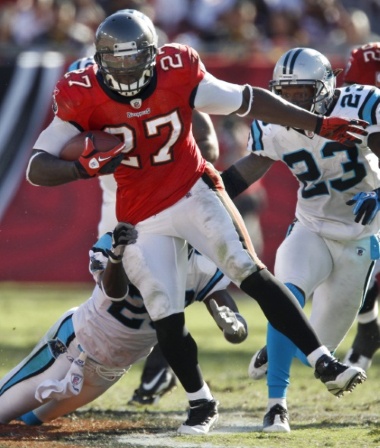


 Hand the rock to LeGarrette Blount 30 times a game. That’s what Raheem Morris says is the Bucs’ offensive identity.
Hand the rock to LeGarrette Blount 30 times a game. That’s what Raheem Morris says is the Bucs’ offensive identity.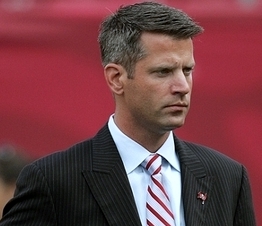
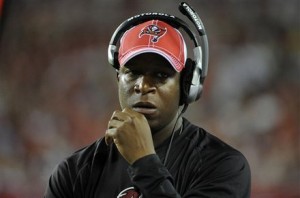
 Earlier today Joe brought word of NBC Sports and Sports Illustrated scribe Peter King wondering about Raheem Morris’ job security and wagging a finger of shame at Raheem for a disparaging quote about the Panthers.
Earlier today Joe brought word of NBC Sports and Sports Illustrated scribe Peter King wondering about Raheem Morris’ job security and wagging a finger of shame at Raheem for a disparaging quote about the Panthers.
 Now Joe doesn’t think the Bucs’ fan club of a few hundred or so in England is anything to be heralded, nor is Joe a fan of their fearless leader, Paul Stewart, who once sent Joe an unprompted scathing e-mail filled with personal attacks against Joe.
Now Joe doesn’t think the Bucs’ fan club of a few hundred or so in England is anything to be heralded, nor is Joe a fan of their fearless leader, Paul Stewart, who once sent Joe an unprompted scathing e-mail filled with personal attacks against Joe.
 Called up to the Bucs roster off the practice squad at the 11th hour before yesterday’s debacle, quarterback Rudy Carpenter will stay on the roster the rest of the season as the Bucs’ third-string quarterback.
Called up to the Bucs roster off the practice squad at the 11th hour before yesterday’s debacle, quarterback Rudy Carpenter will stay on the roster the rest of the season as the Bucs’ third-string quarterback.
 The media vultures are eyeing Raheem Morris not just locally, but nationally as well.
The media vultures are eyeing Raheem Morris not just locally, but nationally as well.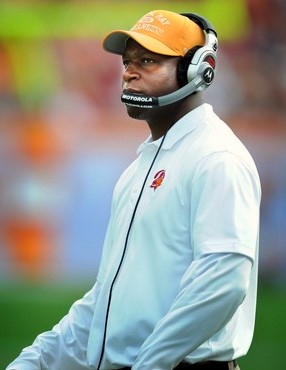

 Josh Johnson is not the reason the Bucs lost today.
Josh Johnson is not the reason the Bucs lost today.

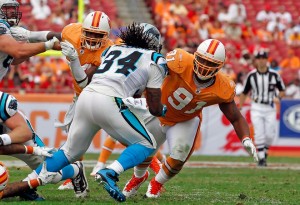
 We’ve all heard Raheem Morris’ core beliefs; the Bucs goal is to play “hard, fast, smart and consistent” at all times.
We’ve all heard Raheem Morris’ core beliefs; the Bucs goal is to play “hard, fast, smart and consistent” at all times.

